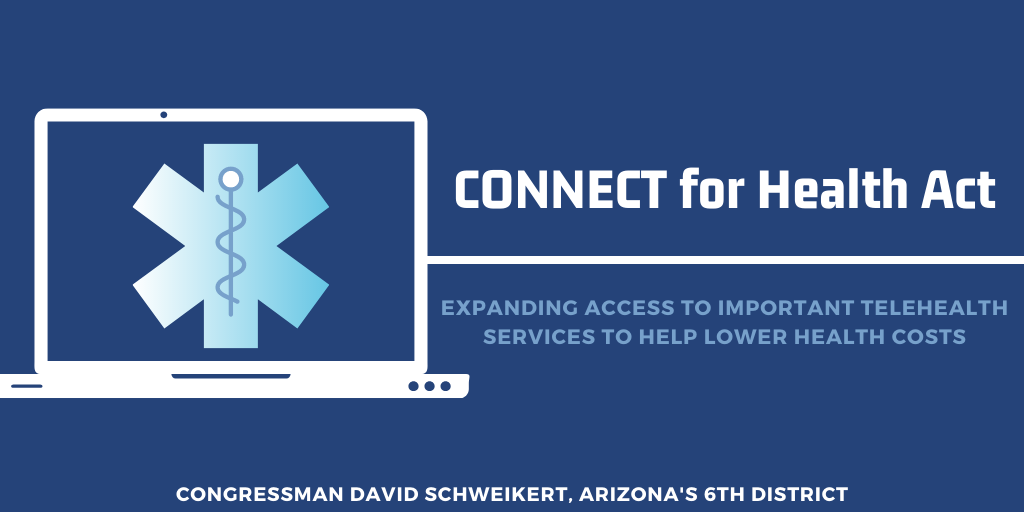WASHINGTON, DC – Rep. David Schweikert (AZ-06), Co-Chair of the Congressional Telehealth Caucus, along with fellow Co-Chairs Rep. Mike Thompson (CA-05), Rep. Peter Welch (VT-AL), and Rep. Bill Johnson (OH-06), announced the introduction of the Creating Opportunities Now for Necessary and Effective Care Technologies (CONNECT) for Health Act. This bipartisan and bicameral package will help expand access to important telehealth services that can lower health costs and make health care more efficient for patients. A Senate companion bill was introduced by Senators Schatz, Wicker, Cardin, Thune, Warner, and Hyde-Smith.
“Whether you are in a suburban, rural, or urban area of the United States, your healthcare access should not be limited. Ensuring Americans have access to innovative healthcare technologies, at an affordable cost, is of upmost importance in our discussion of how we are providing care. We are seeing a revolution in the cost and delivery of healthcare, and now government is taking the right step to remove harmful barriers we have in place. I am pleased to see the CONNECT for Health Act be introduced, and I look forward to working with my colleagues to advance this critical piece of legislation.” said Schweikert
“Telehealth is a proven method of effectively and efficiently delivering health care to patients who need it, particularly in rural areas and regions with health care workforce shortages. I am proud to join my fellow Congressional Telehealth Caucus Co-Chairs to introduce the CONNECT Act,” said Thompson. “This bipartisan bill introduced in both the House and Senate will help bring access to telehealth to more areas across our nation by expanding use to services like mental health and emergency care, improving the implementation process, including new sites that can provide telehealth care like Federally-qualified health centers, and helping providers better monitor patients.”
“Underserved areas in both rural and urban communities desperately need cost-effective solutions to address the gap in health services,” said Welch. “This bipartisan bill will address that gap by expanding telehealth to improve quality of care, increase access and reduce costs across America. This is a commonsense step to make sure that our policies keep pace with our technology.”
“Study after study demonstrates that the use of telehealth to furnish healthcare services is beneficial for quality of care, access to care, and reduced spending,” said Johnson. “However, to keep the ball rolling in the right direction, we’ve got to remove some of the barriers that limit the use of telehealth. This legislation does just that.”
Background:
Studies have consistently shown telehealth to be an effective and cost-efficient health care delivery method, particularly for rural areas and places where there is a provider shortage. It can also be a game changer for patients who have limited mobility or other limitations to accessing traditional health care. The CONNECT Act works to remove current restrictions that limit the ability of patients to access telehealth and build on telehealth strategies that have already been shown to be effective.
The CONNECT Act improves the effectiveness and use of telehealth by waiving certain requirements and restrictions to allow for expanded use of telehealth, allowing mental health services and emergency care to be delivered through telehealth, improving the process of adding telehealth to approved services lists, and adding rural health clinics and Federally-qualified health centers to the list of approved telehealth sites.
This bipartisan bill also allows Native American health facilities to be used as originating sites for telehealth services, waives telehealth restrictions during national emergencies, allows telehealth to be used to recertify patients as eligible for hospice benefits, works to prevent telehealth fraud and abuse, creates reporting and analysis mechanisms, and helps to improve testing for future telehealth models.
###
Back to News

